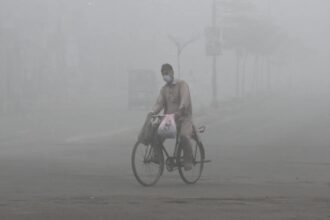TASHKENT: An explosion in a gas field under construction in energy-rich Uzbekistan killed at least two people, authorities said on Wednesday.
Deadly accidents in Central Asian factories as well as gas and oil facilities are common, but Tashkent has long downplayed the issue.
“There are two dead and some wounded,” a representative of the prosecutor’s office said of Tuesday’s explosion, according to state news agency Uza.
Local media, however, reported four deaths, citing a spokesman for the presidential administration.
The accident happened near the southern town of Baysun, where a previous explosion on September 1 released hydrogen sulphide — a deadly gas that attacks the nervous system — for two weeks.
Around 7,000 people work on the construction of the foreign-funded gas-chemical complex there.
A resident of Baysun on Wednesday told AFP that the “smell (of gas) reaches the houses, even with the doors and windows closed”.
Wishing to remain anonymous, she said that authorities “gave the order to close the schools” and that workers were evacuated.
The day after the September 1 explosion, the Minister of Emergency Situations announced evacuations, but assured residents that “everything was under control”.
But local media had said that people in neighbouring villages reported nausea and headaches.
The company drilling the field — Eriell — on Sunday announced that it had plugged the well after the September 1 explosion, with the help of specialists from the US and Russia.
Discovered in the Soviet era, the gas field had not been used until now, largely due to access difficulties.
But Uzbekistan’s massive natural resources are now coveted by major powers, led by Russia, China and the EU.
Despite some opening up after decades of isolation, Uzbekistan remains a country where information is tightly controlled and where the political scene is without competition.
Deadly accidents in Central Asian factories as well as gas and oil facilities are common, but Tashkent has long downplayed the issue.
“There are two dead and some wounded,” a representative of the prosecutor’s office said of Tuesday’s explosion, according to state news agency Uza.
Local media, however, reported four deaths, citing a spokesman for the presidential administration.
The accident happened near the southern town of Baysun, where a previous explosion on September 1 released hydrogen sulphide — a deadly gas that attacks the nervous system — for two weeks.
Around 7,000 people work on the construction of the foreign-funded gas-chemical complex there.
A resident of Baysun on Wednesday told AFP that the “smell (of gas) reaches the houses, even with the doors and windows closed”.
Wishing to remain anonymous, she said that authorities “gave the order to close the schools” and that workers were evacuated.
The day after the September 1 explosion, the Minister of Emergency Situations announced evacuations, but assured residents that “everything was under control”.
But local media had said that people in neighbouring villages reported nausea and headaches.
The company drilling the field — Eriell — on Sunday announced that it had plugged the well after the September 1 explosion, with the help of specialists from the US and Russia.
Discovered in the Soviet era, the gas field had not been used until now, largely due to access difficulties.
But Uzbekistan’s massive natural resources are now coveted by major powers, led by Russia, China and the EU.
Despite some opening up after decades of isolation, Uzbekistan remains a country where information is tightly controlled and where the political scene is without competition.
Source : Times of India









